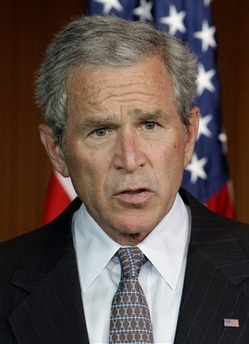Bush won't rule out full Libby pardon
(AP)Updated: 2007-07-04 08:32
WASHINGTON - President Bush on Tuesday refused to rule out an eventual pardon for I. Lewis "Scooter" Libby, leaving open the chance he may wipe away the former White House aide's criminal record after already erasing his prison sentence.
 President Bush speaks to reporters following his visit to Walter Reed Army Medical Center in Washington, Tuesday, July 3,2007, where he visited with wounded military personnel. [AP]  |
The president's stance, on one level, was merely practical. When he commuted Libby's 2 1/2-year prison term in the CIA leak case on Monday, a court ruling had made jail time imminent. Bush has plenty of time to consider a pardon, depending on how Libby's appeals go.
Bush's words had political significance, too. By keeping his options open, he offered hope to the conservative members of his own party who believe he should go further in pardoning Libby. He also kept alive a controversy that could follow him to the last day of his presidency.
Libby, who once wielded enormous influence as chief of staff to Vice President Dick Cheney, was convicted of lying and obstructing justice in a probe into the leak of a CIA operative's identity. The long-running case meant the end of Libby's government career and dovetailed with the broader troubles of Bush's second term in office.
Bush abruptly commuted Libby's prison sentence - an unusual step, given that it had not yet begun - five hours after a federal appeals court panel ruled that Libby could not delay his prison term. Bush left intact the sentence of two years probation and a $250,000 fine, citing a need for some accountability.
In his first public comments on the matter on Tuesday, Bush defended his rationale.
"I felt like the jury verdict ought to stand, and I felt like some of the punishments that the judge determined were adequate should stand," Bush said after visiting wounded soldiers at the Walter Reed Army Medical Center. "But I felt like the 30-month sentencing was severe."
"I made a judgment, a considered judgment," the president added. "I stand by it."
Bush took heat from the left and the right.
The conservative Wall Street Journal editorial page said Bush's unwillingness to pardon Libby was "another profile in non-courage."
On the other side, Sen. Chuck Schumer, D-N.Y., said of the prospect of eventual pardon for Libby: "The motto of this administration seems to be: When you're in a hole up to your neck, keep digging."
Unlike the commutation, a pardon would wipe away Libby's felony conviction.
White House officials cautioned against reading too much into Bush's comment that he wouldn't rule out a pardon. Spokesman Tony Snow - directly addressing those arguing for a pardon - said the jury system must be respected.
The commutation created confusion about whether Libby could still serve his two-year term of supervised release - a form of probation available only to people who have completed their prison term. US District Judge Reggie B. Walton ordered prosecutors and attorneys to suggest how to continue.
Under supervised release, Libby would have to submit written reports to probation officers each month and secure full-time employment. He would be prohibited from traveling without permission.
Libby is not yet eligible to apply for a pardon under the Justice Department's guidelines. Criminals must wait at least five years after completing their sentences before they can apply for presidential pardons, although Bush could unilaterally issue him one.
Some lawyers said Bush's statement about Libby's harsh sentence showed that the administration was out of touch with today's federal sentencing guidelines. People like Libby - first-time, nonviolent offenders - receive lengthy sentences every day, they said.
"This was a very common sentence, not a startling
sentence," said former federal prosecutor Scott L. Fredericksen, who has served
under ever president since Ronald Reagan.
| 1 | 2 |  |
|
|
|
||
|
||
|
|